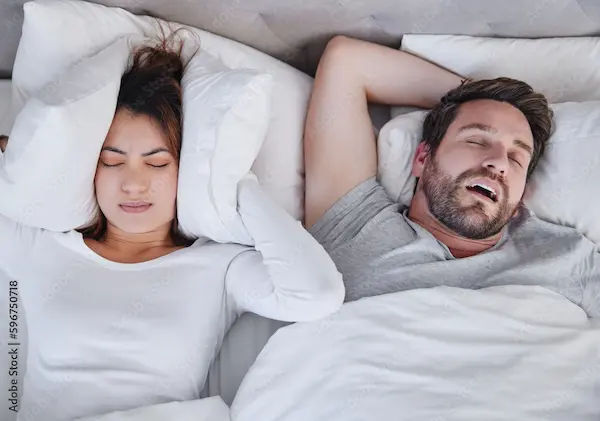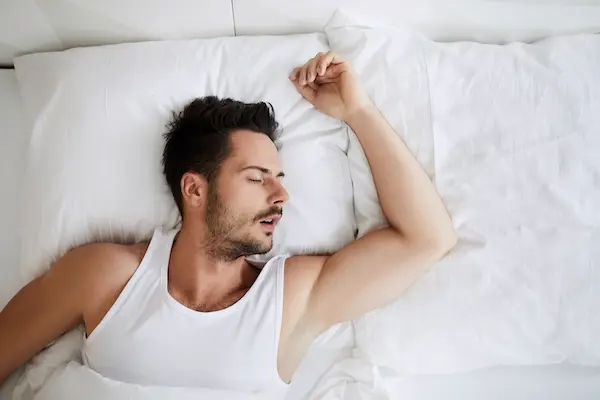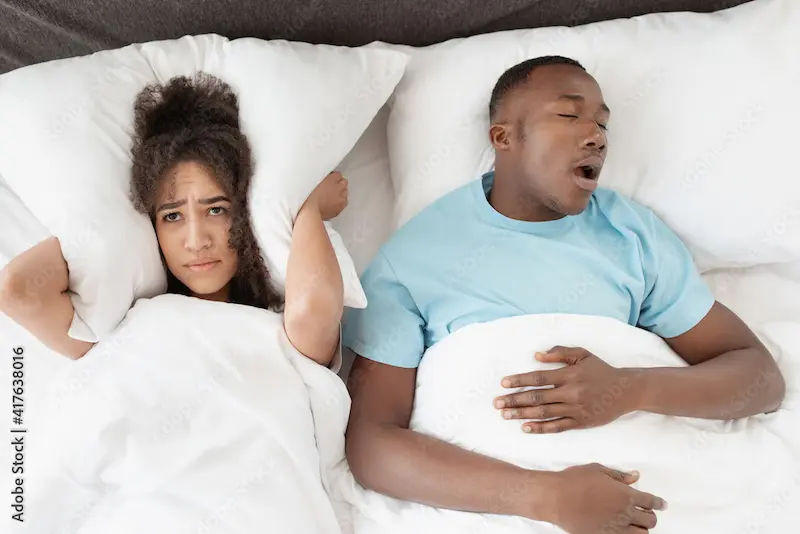How to Reduce Snoring: Lifestyle Changes, Home Remedies & More
Discover effective lifestyle changes, medical treatments, and health insights to reduce snoring and improve sleep quality for overall well-being. Learn the risk factors associated with snoring and when to seek medical help.

Written by
Last updated on 13th Jan, 2026
Snoring is an issue among millions of people across the globe and negatively affects both the quality of sleep and connections between partners. It occurs when the nasal passage and throat are partially obstructed during sleep, thus creating tissue vibration. Chronic snoring beyond occasional episodes signals potential medical issues which need examination. Various factors such as deviated septum and enlarged tonsils and lifestyle elements consisting of obesity, alcohol consumption, and sleep position can cause snoring.
Understanding the origins of snoring, identifying potential risk triggers, and available treatment types through sleep hygiene and lifestyle adjustments are the most effective management solutions for assessing when medical assistance becomes necessary.
Risk Factors Associated with Snoring
Snoring patterns heavily depend on environmental conditions and how people choose to live their lives:
Various risk factors, such as bad sleeping routines, together with drinking alcohol before bed and smoking, create higher chances of developing snoring symptoms along with environmental allergies.
The intensity of snoring responds directly to two unassuming conditions: pillow elevation and the dampness of indoor air.
Exposure to irritants combined with the sleeping habit of lying on one’s back makes snoring worse.
Multiple health conditions appear along with snoring patterns, but Obstructive Sleep Apnea stands as the most dangerous one.
The structure of the tonsils, deviation of the nasal septum, and extra tissues in the throat area limit breathing during sleep, resulting in snoring.
Nasal congestion from allergies, as well as the hormonal changes associated with pregnancy and menopause, together present major causes of snoring.
Lifestyle Changes to Reduce Snoring
Excess body weight squeezes the upper airway while sleeping, causing heavier snoring episodes. In this regard:
The combination of proper diet and exercise allows people to reduce their weight enough to significantly decrease their snoring.
This strategy provides better sleep quality and numerous health advantages, making it an ideal primary intervention for reducing snoring.
Sleep position and daily routines are essential elements that help reduce snoring.
Sleeping on your side is more advisable than back sleeping, as this position prevents the tongue from blocking your airway and keeps throat tissues from collapsing.
Elevating the head of one’s bed by 4-6 inches reduces obstructed airways and snoring frequency at night.
Home Remedies for Snoring
Using humidifiers lowers snoring by keeping bedroom air moisture at proper levels:
Dry air inflames nasal pathways and throat membranes, intensifying snoring. Regular use and maintenance of humidifiers create lubricated airways, decreasing tissue vibrations during sleep.
Maintaining the device between 30-50% humidity will yield optimal outcomes, but you should periodically clean it to prevent mould formation and bacteria accumulation.
Nasal strips and dilators are non-surgical approaches to mitigate nasal congestion-driven snoring and conditions stemming from nasal structure abnormalities.
Nasal strips function externally by stretching nostrils and enlarging nasal passages to enhance air passage. The adhesive strips deliver excellent results to people who experience nasal valve collapse or have mild congestion.
Users can insert soft, flexible devices, such as internal nasal dilators, into their nostrils to expand their nasal passageways. For these methods to work effectively, nasal obstruction must be the leading cause of snoring.
Medical Treatments for Snoring
Continuous Positive Airway Pressure (CPAP) therapy is the primary medical solution for treating severe snoring alongside sleep apnea. In this regard:
A machine delivers pressurised air through a sleep mask to prevent airways from collapsing and keep them open during sleep.
CPAP therapy works best when patients use it regularly, and the mask is fitted correctly. It demonstrates high effectiveness, but some users require adaptation time before successfully using the device for continuous sleep.
Medical procedures become necessary after non-operative treatment methods prove unhelpful for the condition.
Two main surgical procedures treat sleep apnea: Uvulopalatopharyngoplasty (UPPP) removes tissue from the throat, while Maxillomandibular advancement (MMA) moves jaw structures to increase air passages.
Radiofrequency tissue ablation and soft palate implants both constitute minimally invasive procedures.
Surgical interventions primarily treat severe cases of snoring. Yet, medical professionals must assess individual patient characteristics to select appropriate candidates because the specific reasons for each patient's snoring condition impact therapeutic outcomes.
Role of Diet and Nutrition to Reduce Snoring
Several food items directly affect the frequency or occurrence of snoring during sleep:
Eating high-fat dairy products, processed foods, and too much red meat can cause inflammation and mucus production, worsening snoring symptoms.
Big meals consumed late at night and inflammatory foods worsen snoring symptoms by influencing muscles and breathing control. These triggering foods should be wholly avoided pre-bedtime for better sleep quality.
The right nutritional choices reduce the occurrence of heavy snoring during sleep. Noninflammatory foods like fish's omega-3 acids, antioxidants in fruits and veggies, and proper hydration work together to maintain healthy breathing.
Three essential nutrients, magnesium, vitamin D, and vitamin C, help improve airway muscle function while reducing inflammation.
Importance of Proper Sleep Hygiene for Reducing Snoring
A consistent sleep schedule is the essential step to decreasing snoring frequency:
Regular sleep-wake schedules help one’s body's clock operate while creating better sleep quality and reducing chances of nighttime snoring.
Developing a steady sleep pattern with a minimum of 7-9 hours remains essential. Random sleep schedules break natural sleep rhythms, leading to nighttime breathing interruptions.
Proper sleep requires temperature management because a space maintained at 15-19°C establishes the best environment for rest.
To reduce noise interference, earplugs and white noise machines should be used alongside blackout curtains or eye masks for complete darkness.
Choose a mattress and pillows that align your spine correctly to help prevent your airways from blocking.
People should also avoid electronic devices before going to bed, as the blue light they emit alters sleep quality and worsens snoring.
When to Seek Medical Advice for Snoring?
Healthcare evaluation becomes necessary for severe snoring conditions after recognising dangerous indications that demand prompt medical care:
Patients who experience noisy and persistent nighttime breathing, choking or gasping episodes, daytime sleep problems, morning headaches, and nighttime breathing interruption should seek medical help.
Healthcare professionals suggest medical evaluation when snoring creates continuous sleep interruptions for an individual or their partner or when one feels tired despite having enough sleep.
Sleep apnea produces various medical complications that move past interrupted sleep patterns. Without treatment, it will result in dangerous medical problems which cause high blood pressure and cardiovascular disease as well as stroke and elevate the chance of developing type 2 diabetes.
The neurological effects of sleep apnea include forgetfulness as well as mood disorders and reduced mental processing capabilities.
A complete sleep study is required to diagnose sleep apnea. It enables doctors to create suitable treatments that reduce significant health risks.
Understanding the Impact of Snoring on Health
The condition of one's cardiovascular system experiences severe impact from both chronic snoring and sleep apnea:
The combination of long-lasting loud snoring causes inflammatory responses and elevates blood pressure, which stresses heart function.
The cycles of interrupted oxygen supply at night produce physiological stress that could result in hypertension and coronary artery disease and increase stroke risk.
Cardiovascular complications arise due to the body's failure to regulate sleep-time cardiovascular responses and oxygen distribution.
Snoring produces serious mental health consequences, which surpass regular sleep disturbance. The continuous development of mood disorders along with cognitive decline and elevated stress occurs due to snoring-related poor sleep quality.
Enduring fatigue makes people irritable while decreasing their mental focus until they show signs of anxiety or depression.
Snoring creates a strain in the relationship between an individual and their partner, which aggravates psychological distress.
Conclusion
Snoring extends beyond being a nightly inconvenience because it represents a serious health problem affecting people in multiple dimensions. Knowledge about snoring origins, combined with risk elements and treatment choices, allows people to make informed choices that strengthen sleep quality alongside cardiovascular health and overall wellness.
Patients must consult healthcare experts, implement lifestyle modifications, and practice sound sleep habits to effectively reduce and control their snoring issues.
Consult Top ENT
Consult Top ENT

Dr. Nishant Rana
Ent Specialist
8 Years • MBBS. MS ENT
Delhi
Apollo Hospitals Indraprastha, Delhi

Dr. D. Naveen Kumar
Ent Specialist
15 Years • MS
Chinagadila
Apollo Hospitals Health City Unit, Chinagadila
(25+ Patients)

Dr. Praveen Sirdesai
Ent Specialist
20 Years • MS
Secunderabad
Apollo Hospitals Secunderabad, Secunderabad

Dr. Tanvi Choubey
Ent Specialist
7 Years • MBBS, MS (ENT). Fellowship in Head Neck Onco Surgery . Consultant - ENT
Rourkela
Apollo Hospitals, Rourkela, Rourkela

Dr. Safina Kauser
Ent Specialist
7 Years • MBBS, MS
Bengaluru
Apollo Clinic, JP nagar, Bengaluru



